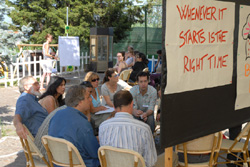The application of participatory procedures differs significantly from one institution (and country) to the other. In some cases, participatory methods are considered as too difficult to be introduced in the national political culture. In other cases, these procedures only have been used on an experimental basis so far. But in certain countries (such as Denmark, the Netherlands, and Switzerland), using these procedures became part of the common methodology to provide advice for policy-making, as well as to stimulate public debate. The organisations concerned in the meantime have acquired substantial and lasting expertise.
Posters with a description of Citizens Jury, Consensus Conference, Future Search, ITA, Focus Group and Scenario Workshop can be opened via this training package (links to be made to pdf files).
The CIPAST platform (www.cipast.org)

gives a general overview and an introduction to the main procedures and main actors.
- Consensus Conference
- Scenario Workshop and other workshop methods
- Citizen’s Jury
- Café Seminar (World Café)
- Planning Cell
- Interactive Technology Assessment (ITA)
- Future Search
- Focus Groups
- Open Space
The Danish Board of Technology constantly publishes about new methods, while existing methods are being updated and adjusted. Some of the described methods were developed by the DBT, while others have been borrowed from international or other Danish institutions. In the left column, you can locate a description of the methods they employ. The methods of technological assessment are central to the work of the Danish Board of Technology. That's why they place a great emphasis on a wide versatility of their methods:
Inter-disciplinary Work Groups
Interview Meeting
Cafe Seminar
Citizens’ Summit
Citizens’ Jury
Citizens Hearing
Future Panel
Hearings for Parliament
More information about methods used and described in the CIPAST context and additional information can be found in Design/ ‘Some basic principles’ , as well as on the CIPAST website or in the bibliography in What else?/ ‘Bibliography’ .
You also can find overviews at:
People & Participation: How to put citizens at the heart of decision-making, A description of methods used in the UK, Involve 2005, www.involving.org
The Toolkit on participatory methods' contains a presentation of different methods, a step-by-step, a hands-on manual with detailed checklists, and realistic expectations of outcomes. http://www.viwta.be/files/30890_ToolkitENGdef.pdf


